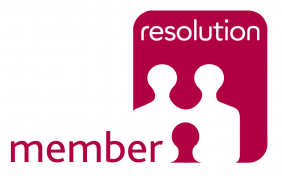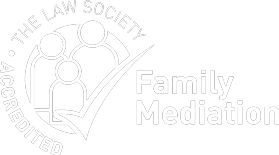Meet the mediator
A report published at the end of 2020 once again highlighted a need for families to avoid taking their disputes to court if they can. The court system is overburdened; cases are taking too long to come before judges. And there is wide recognition that alternative dispute resolution methods can get families not just a quicker outcome, but also one that is reached more constructively and amicably than through court.
As a firm, we’ve long encouraged clients to avoid the litigious route wherever possible. There are other options, and the momentum continues towards finding more routes to helping people work through their issues together.
We catch up with Thomas Mansfield Partner and recently qualified mediator, Alice Scambler, to quiz her on all things mediation:
Congratulations on your new qualification! How does it feel to be a fully-fledged mediator?
Thank you! It feels great. It’s been quite an intensive process, especially with lockdowns in the mix, but I’m so happy to have qualified and can’t wait to get going.
Is mediation part of a legal process or is it counselling?
It isn’t either! Mediation is designed to facilitate discussions between separating partners to help them reach their own decisions about how their future will look. It can include discussions about divorce, properties, finances generally and, often, arrangements for children. The process involves a series of meetings between the participants and the mediator. The mediator will not give legal advice, but can give information that will assist the participants in their discussions and help resolve the issues between them.
Why use a mediator?
Relationship breakdowns can be particularly emotional and difficult times. It is not always possible for a couple to agree directly between them what should happen and the mediation process is known to be a productive and structured way to improve communication. Often, the couple will find for themselves solutions to seemingly unresolvable disagreements, with the assistance of a mediator in guiding them towards the practical options.
There is also a requirement, in most cases, for mediation to be considered before an application can be made to the Family Court – parties have to attend a Mediation Information and Assessment meeting (known as a MIAM). The mediator will discuss whether the contentious court process can be avoided and, if not, they will complete the form enabling the court application to be issued.
Is mediation less expensive than court?
You can absolutely save money by mediating rather than engaging in court proceedings. You are paying for one professional instead of two separate lawyers and, although the mediator’s hourly rate is similar to that of a lawyer, it will usually be divided between you and your former partner, so that you each pay half of the fees. Legal aid is also available in some circumstances for family mediation and I recommend checking to see if you qualify before arranging to pay privately. Mediation has a high success rate, meaning that you are likely to reach a conclusion far more quickly than if you go through court proceedings. This can help keep your costs to a minimum.
At what stage is it best to involve a mediator?
You can instruct a mediator at any stage after you have decided that your relationship is at an end, although it is easier to do so at the outset – ideally, before any positioning takes place, which tends to happen when you each instruct separate lawyers. Mediation is a voluntary process and works best when both parties are in a good frame of mind to cooperate and collaborate and are actively engaged in the process. This can take time, and the beauty of mediation is that the participants set their own agenda and can control the pace and timescale.
Are lawyers needed at all in mediation?
It is a good idea to have some legal advice from a solicitor alongside the mediation process and at the end, so that the documents recording the agreement you’ve reached can be converted into a Consent Order. Consent Orders have to be sent to court and approved by a Judge in order to become binding.
How would you describe a mediator’s role?
The mediator works as a facilitator to help the separating couple find ways to communicate and to move past the issues that might have caused the relationship to breakdown. They will assist them in constructive discussions about the future by guiding them through the financial disclosure process and helping them move past any areas of impasse. The result is an improvement in communication and if an agreement is reached, it is much more likely it will be adhered to because the parties have entered into it freely and without a court imposing anything on them.
What should be expected at a first meeting with a mediator?
The first meeting will be an individual meeting between you and the mediator. You can ask any questions you might have and the mediator will give you a thorough explanation of the process, to help you decide if it is right for you, both emotionally and practically. If you would like to proceed, your partner will be invited to have an individual meeting on the same basis. Or it might be that your partner has already attended a first meeting and you are now being invited to meet the mediator. It does not matter who initiates the process, the mediator will remain unbiased and even-handed, regardless of who they see first. If both parties wish to proceed, the next step will be for a joint meeting to be arranged. Meetings are usually face-to-face but, in these times of lockdown, they are taking place just as effectively using a video platform instead.
What does it take to become a mediator?
Being an effective mediator requires very different skills to being a lawyer and it is important that the mediator you choose has undergone the training required and is registered with the Family Mediation Council. There is a mediation Code of Practice they must comply with, and the most important principle of the Code is borrowed from the Hippocratic Oath: “do no harm”. Instructing a mediator is a very personal decision and you need to ensure that they are not only suitably qualified but that they are professional, ethical and that you trust them enough to bring them into a very personal area of your life.
Does a mediator have to be a lawyer?
Mediators do not need to be lawyers, but it can help. Having been a family solicitor for 13 years, I have the background knowledge required to know the factors a court would ultimately take into account and whether an agreement reached at mediation is appropriate and fair and, therefore, whether the court is likely to approve the Consent Order.
It is believed that mediators need to be well versed in psychology. Do you agree?
I have always been interested in psychology and chose to study it at A-level before embarking on my law degree. I am sure there is a link between law and psychology, as both involve the study of human conflict and identifying different ways of dealing with them. The most important skills to utilise as a mediator in my opinion however are listening skills, empathy, integrity, competence, fairness and honesty. A psychology A-level, although useful, is not required!
Why did you decide to get the qualification?
As a family lawyer, I have always set a goal of reaching the swiftest, most amicable resolution for my clients. I am often asked if I can talk to a client’s spouse to help resolve a dispute but, as a lawyer for just one of the parties, I can’t. Mediation is different. It enables me to go into a room with both parties and to hear both sides of the dispute. I am excited to help families reach solutions that will work for their entire family, without the confrontation usually associated with court proceedings.
Can lawyers who are qualified to mediate also litigate? Would you?
Absolutely. With the best will in the world, not every case is suitable for mediation. The most important thing is to identify the route suitable for the particular couple. In cases where there has been domestic abuse, or where one person would use the process to exert control or bully the other, it would be inappropriate to mediate. There are other circumstances where urgency requires the matter to be brought before a court without delay. I regularly support my clients through court proceedings and view mediation as an alternative option, not a replacement.
What do you think your role as a mediator will bring to your work as a Family Law solicitor?
Mediation requires you to consider all aspects of a dispute and to get to know the family as a whole; their relationship dynamics, characters and past experiences that might be shaping their perspective on the current issues. Taking this holistic approach into my legal practice makes me better equipped to tackle any Family Law situation, whether it’s a bitter dispute about where the children of the relationship should live, or the financial terms on which each party in a divorce will walk away. Mediation is all about narrowing the issues, focusing on what really matters, and finding a way of achieving an outcome that works for everyone, and these skills are all incredibly useful in resolving any legal dispute. For clients, this means a solid steer in the right direction, and as quick, pragmatic and beneficial a resolution as we can get to suit them and their situation.
To speak to me about mediation, or any other Family Law issue,
call me on 020 3811 2894 Or email me: [email protected]










